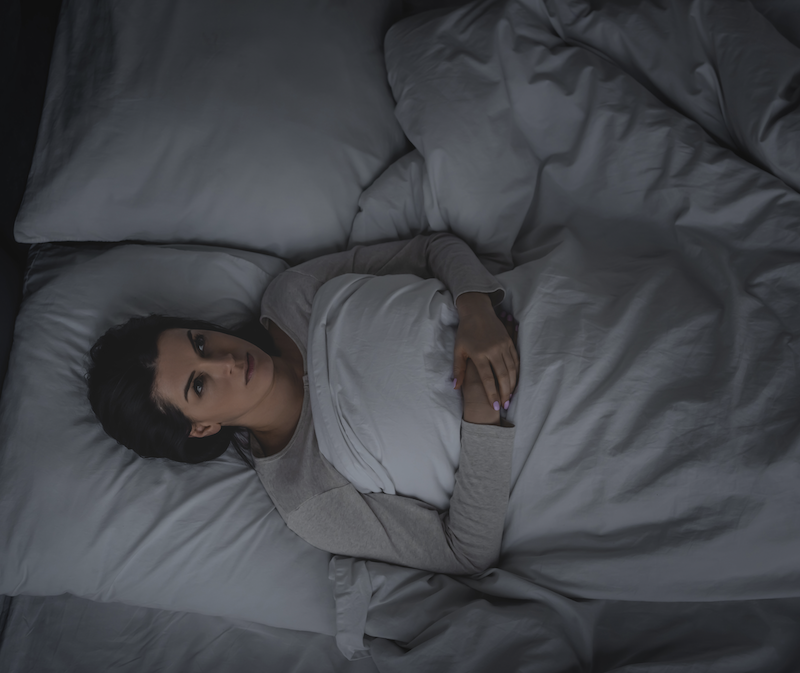
Sleep paralysis can make you feel reluctant to go to bed, and the stress alone can keep you from falling asleep. With sleep paralysis, you may feel anxious in the evening leading up to bedtime and experience insomnia.
If you’re looking for answers, read on to learn our top five facts about sleep paralysis and tips to try to stop it.
1. What Is Sleep Paralysis?
When you’re transitioning between the stage of being awake to initially falling asleep, sleep paralysis is the feeling of being conscious but not being able to move. Although it only lasts from a few seconds to a few minutes, it can become a distressing experience because of the mixed state of consciousness.
Since sleep paralysis occurs during the REM (rapid eye movement) stage of the sleep cycle, it’s also referred to as REM parasomnia.
Isolated sleep paralysis is when the episodes aren’t connected with a diagnosis of narcolepsy, which is a neurological disorder that disrupts the body’s ability to control wakefulness. Recurrent sleep paralysis happens multiple times either throughout the night or frequently during the week or month.
2. What Causes Sleep Paralysis?
Unfortunately, the exact cause of sleep paralysis is unknown to scientists at this time.
However, there are a few conditions that are connected to greater experiences of sleep paralysis, such as:
- Shift Work or Jet Lag
- Post-Traumatic Stress Disorder
- Anxiety and Panic Disorders
- Insomnia
- Narcolepsy
It’s important that you speak with a doctor if you are experiencing sleep paralysis since the possible causes have different treatments.
3. What Are the Sleep Paralysis Symptoms?
Now that you know more about sleep paralysis, what are the symptoms? The inability to move your body along with hallucinations are why many people have terrifying experiences with sleep paralysis with only a minority of people having pleasant experiences with their hallucinations and atonia, which is a brief loss of muscle control.
Hallucinations are the highest indicator of sleep paralysis. According to a 2018 study, 75% of sleep paralysis episodes include hallucinations.
Some of the most common hallucinations are intruders or a feeling that there’s another person or presence in the room with the sleeper. They can experience out-of-body or flying sensations along with feelings of chest pressure or suffocation.
4. How Is Sleep Paralysis Diagnosed?
If you find that you’re experiencing sleep paralysis, it’s important to speak with your doctor and provide as much information as you can. If you are having trouble remembering the details, keep a sleep diary by your bed that allows you to write down your experiences as soon as you are fully awake.
You’ll also want to discuss your health and family history. As previously stated, people who experience stress disorders, insomnia, and more seem to be more likely to develop sleep paralysis.
Lastly, your doctor may refer you to a sleep specialist in order to get you the help you need. They’ll conduct overnight or daytime sleep studies to pinpoint the root of the problem.
5. How to Stop Sleep Paralysis
Your first step needs to be to speak with a doctor, especially if you’ve experienced frequent sleep paralysis. They can help steer you towards a sleep specialist or diagnose you with a condition that could be causing the sleep paralysis, such as treatment for narcolepsy.
After you visit a doctor, stopping sleep paralysis is all about sleep hygiene and sleep management.
Here are a few tips to get you started:
Reducing Stress
Stress can be linked to sleep paralysis. According to a study published in the Sleep Medicine Reviews Journal, researchers found that those experiencing PTSD and to a lesser extent social anxiety had higher rates of sleep paralysis. Reducing stress can mean different things to different people.
For instance, if you lead a mainly sedentary lifestyle, 150 minutes of moderate-intensity exercise each week can provide numerous health benefits that include stress reduction. Therapy and trauma counseling can also help you work through past experiences that are affecting your well-being.
Regular Sleep Schedule
A regular sleep schedule can also help treat sleep paralysis. A study conducted in 2018 found that there’s a close association between sleep quality and the chances of developing sleep paralysis. To improve the quality of your sleep, here are a few things you can do:
- Expose Yourself to Light As Soon as You Wake Up so That Your Brain Stops Producing Melatonin
- Turn Off Your Phone, Screens, and Lights at Night—The Darkness Produces Melatonin, Inducing Sleepiness
- Skip Naps During the Day so That You Feel Tired at Night
- Keep Your Bedroom Between 60 and 67 Degrees Fahrenheit
- Try to Go to Bed at the Same Time Each Day
- Aim for Seven to Nine Hours of Sleep Each Night
Remember that it takes time to adopt these practices. For instance, if you’re used to taking naps during the day, try to shorten them instead of stopping them entirely. Aim for 30 minutes or less in the afternoon so that naps don’t disrupt your nighttime sleep.
With sleep paralysis, your body is in the in-between state of sleep and wakefulness, and the hallucinations you experience can seem real.
Speak to your doctor as soon as you can while looking into ways you can reduce the stress in your life and get yourself on a regular sleep schedule. Last but not least, keep a sleep journal next to your bed so that you can keep track of your experiences as well as your progress.




